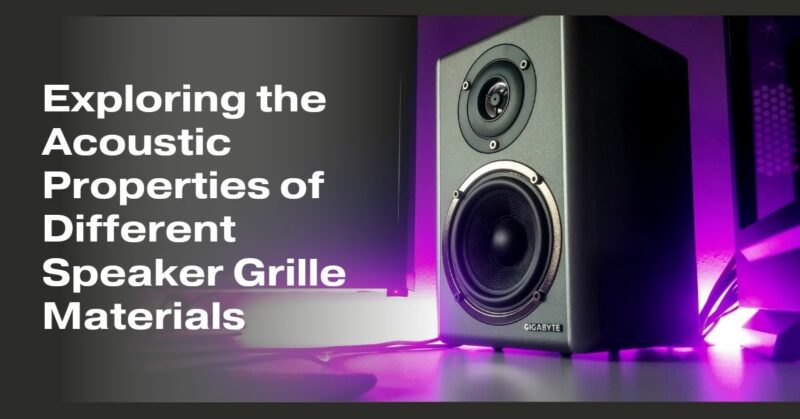When it comes to speakers, many audiophiles focus on drivers, enclosures, and crossovers, but the choice of speaker grille material can also have a subtle yet important impact on audio performance. In this exploration, we’ll delve into the acoustic properties of different speaker grille materials and how they can affect your listening experience.
The Purpose of Speaker Grilles
Before we discuss the materials, it’s essential to understand why speaker grilles are used:
- Protection: Grilles protect the delicate speaker drivers from physical damage, including accidental bumps or pokes.
- Aesthetics: Grilles provide a visually appealing and uniform appearance to the front of the speaker, concealing the drivers.
- Dust and Debris: They help prevent dust and debris from accumulating on the speaker drivers, which can impact sound quality over time.
- Sound Transparency: Grilles should ideally allow sound to pass through with minimal interference, preserving the speaker’s intended audio performance.
Common Speaker Grille Materials
Different materials are used for speaker grilles, each with its own acoustic properties:
- Cloth: Cloth grilles are a common choice due to their transparency to sound. They have minimal impact on audio performance and are often used in high-end speakers. However, the thickness and weave of the cloth can affect how sound passes through.
- Metal: Metal grilles, often made of aluminum or steel, offer durability and protection. While they can allow sound to pass through, they may introduce slight reflections or diffraction, especially if they have a perforated design. The thickness and hole pattern influence their acoustic properties.
- Wood: Some speakers use wooden grilles, which can enhance aesthetics but might have a more noticeable impact on sound due to their solid nature. Wood can reflect and diffract sound waves, potentially affecting imaging and dispersion.
- Plastic: Plastic grilles are lightweight and affordable but can vary in transparency to sound. Thicker or more solid plastic materials may interfere with sound more than thinner or perforated designs.
Grille Design and Acoustics
The design of the grille, including its thickness and hole pattern, plays a significant role in how it affects sound:
- Thickness: Thicker grilles tend to have a more pronounced impact on sound, especially at higher frequencies. Thin, acoustically transparent materials are preferred for minimal interference.
- Hole Pattern: Perforated grilles with evenly spaced holes can allow sound to pass through with fewer reflections and diffraction effects compared to irregular hole patterns or solid materials.
Balancing Protection and Acoustics
Choosing the right speaker grille material is a balance between protection and preserving sound quality. Here are some considerations:
- Sound Quality: If pristine audio quality is a top priority, opt for grilles made of acoustically transparent materials like cloth or metal with a well-designed hole pattern.
- Aesthetics: Grille material can significantly impact the speaker’s appearance. Consider the overall design of your audio setup and how the grille fits in.
- Practicality: In environments where physical protection is crucial, such as households with children or pets, a sturdy grille material like metal might be preferred.
- Customization: Some high-end speakers offer interchangeable grilles, allowing you to experiment with different materials and designs to find the best balance.
In conclusion, while speaker grille materials may not be the first consideration for many audio enthusiasts, they can influence sound quality and aesthetics. Understanding the acoustic properties of different materials and their impact on sound can help you make informed choices when selecting or customizing your speakers to achieve the audio experience you desire.


